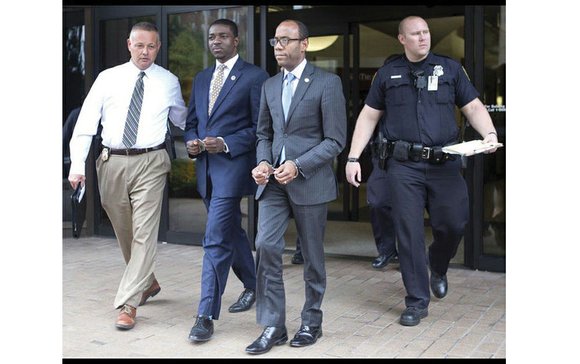Voting rights fight comes to Va.
Free Press wire reports | 8/12/2016, 11:13 a.m.

National NAACP President Cornell William Brooks and Stephen Green, the civil rights organization’s youth director, were arrested Monday in the Roanoke office of Republican Congressman Bob Goodlatte after a six-hour sit-in calling for the full restoration of the federal Voting Rights Act, the NAACP said.
The men were charged with trespassing in the office of Rep. Goodlatte, who represents Virginia’s 6th District and is chairman of the House Judiciary Committee.
Mr. Brooks and members of the Roanoke Branch of the NAACP held a news conference outside the office and then began the sit-in protesting Rep. Goodlatte’s refusal to hold hearings on the discriminatory voting laws enacted and proposed in many jurisdictions after the U.S. Supreme Court ruled that nine states no longer are required to get federal approval for voting rule changes that affect minorities.
NAACP members said they are frustrated that Rep. Goodlatte hasn’t allowed legislation to restore key portions of the federal civil rights legislation to come before his committee.
“With the fate of our national moral character at stake, we must hold our elected leaders responsible to act to uphold the constitutional rights guaranteed for all citizens to vote and participate in our democracy,” Mr. Brooks said.
Virginia is among the states — mostly all in the South — that no longer need pre-clearance by the U.S. Justice Department before enacting voting changes.
The protest and rally were held “to honor the 51st anniversary since President Lyndon B. Johnson signed the Voting Rights Act into law on Aug. 6, 1965, effectively banning state laws that denied the vote to black and minority voters for decades in Virginia and other Southern states,” according to the NAACP.
Three years ago, the U.S. Supreme Court struck down portions of the law that prohibited states from changing local election laws without federal review in the case of Shelby v. Holder.
Almost immediately, several states and localities enacted laws designed to discourage minority voters. Some counties in Texas and other states have changed rules to close polling places in minority communities, making voters in black and Latino communities wait in line for hours to cast ballots.
Additionally, several states passed laws tightening curbs on the type of identification voters must show in order to vote.
“We’ve seen a Machiavellian frenzy of voter suppression from one end of this country to the other, where states have worked systemically to make it harder for young people, college students and minorities to vote for the candidate and party of their choice on Nov. 8,” Mr. Brooks said.
Critics said such provisions aim to cut turnout by minorities and poor people, who rely more on flexible voting methods and are less likely to possess state-issued photo IDs. Proponents of such laws say they aim to eliminate voter fraud.
However, a 2012 study at Arizona State University showed in-person voter impersonation on Election Day to be virtually non-existent.
Federal courts recently have blocked laws in states such as Texas, North Dakota, North Carolina and Wisconsin as being discriminatory and violating the federal Voting Rights Act.
Remedies to combat unconstitutional voting discrimination are in place, Rep. Goodlatte said in a statement to media.
“We will continue to monitor this very important issue to ensure the voting rights of all Americans are protected,” he said.
Mr. Brooks and Mr. Green were cited for criminal trespassing and refusing to sign a summons. Both men were released by police, an NBC affiliate in Roanoke said.





